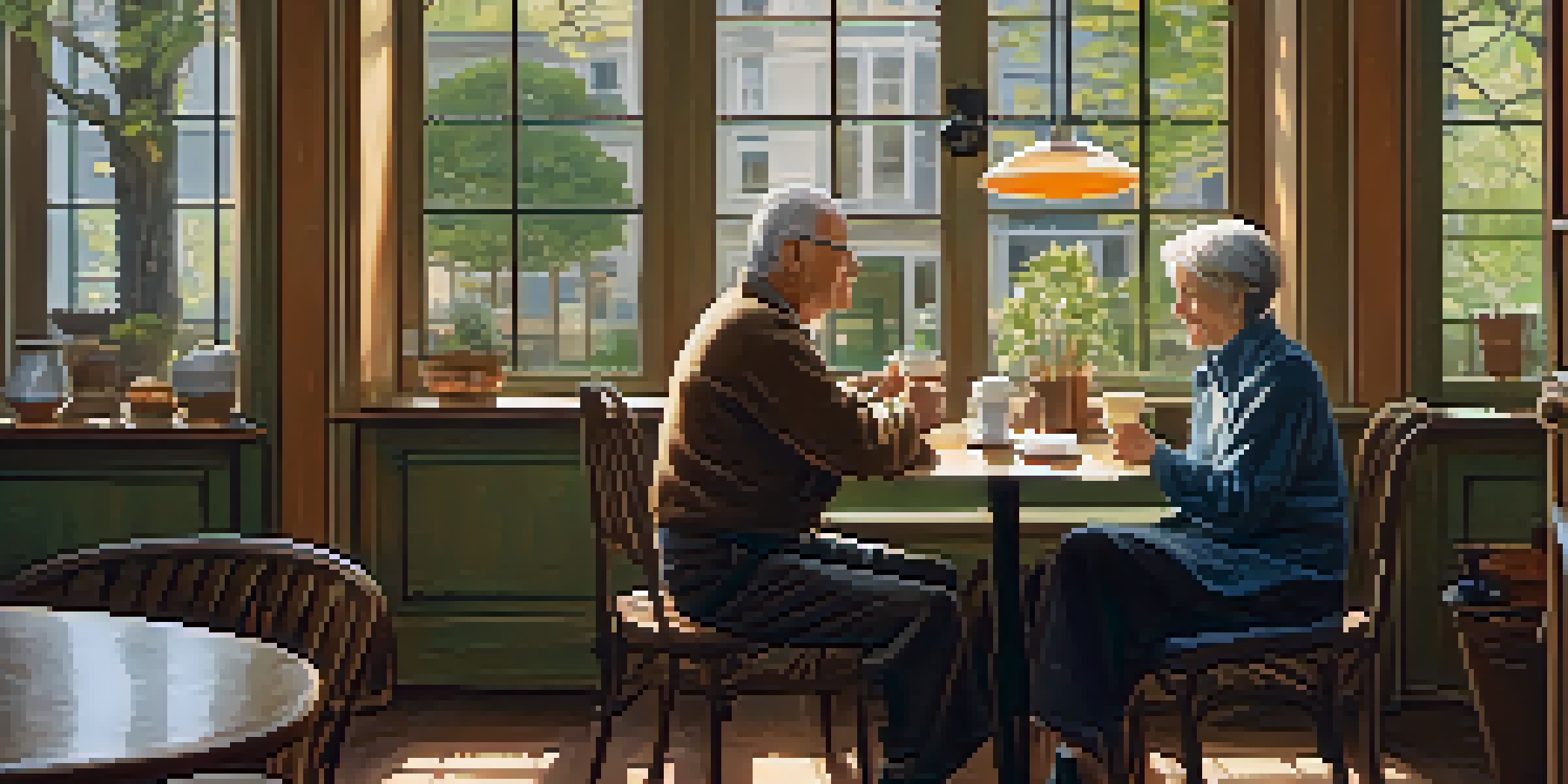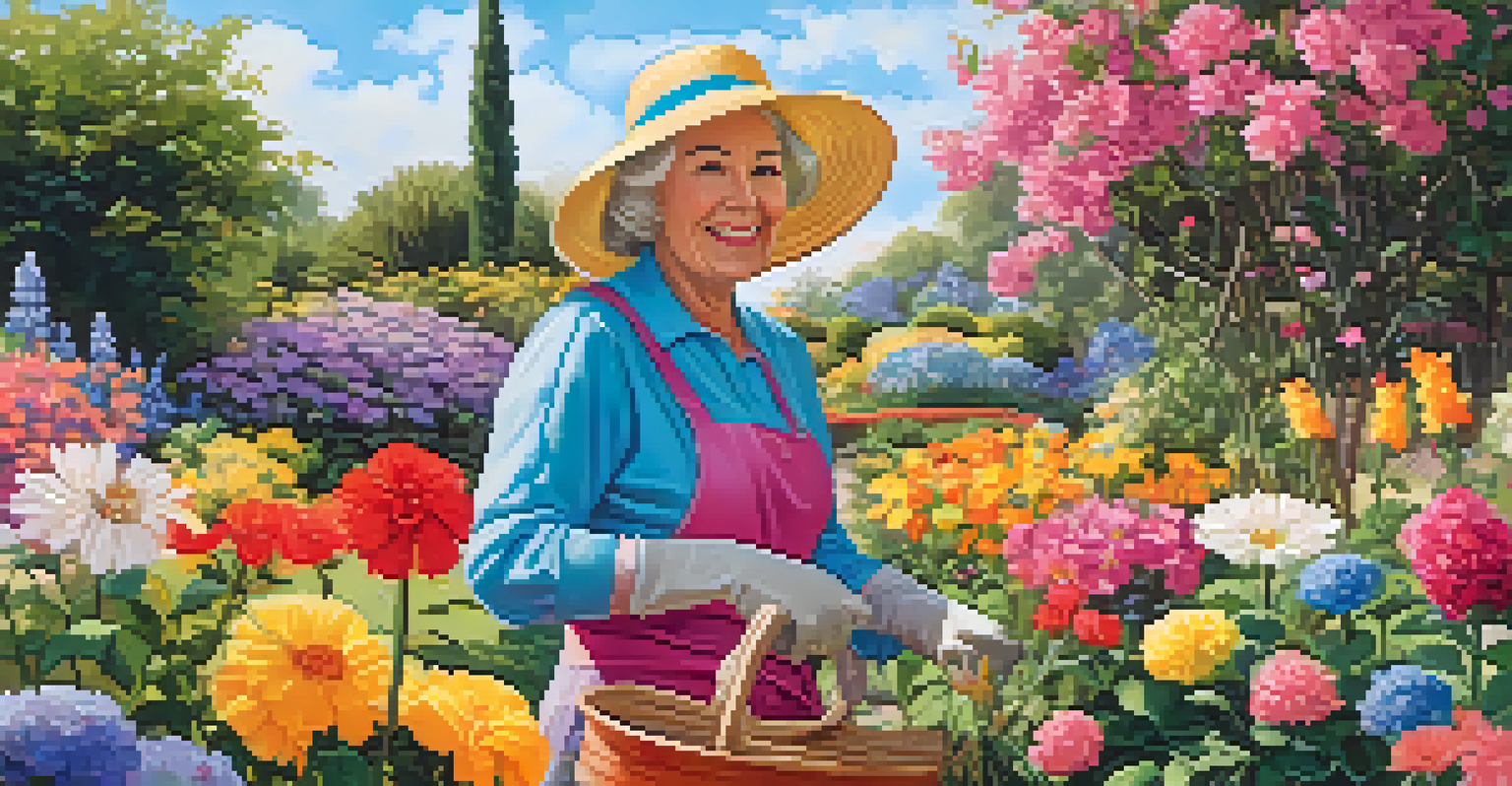The Evolution of Aging Characters in Modern Cinema Today

From Stereotypes to Depth: The Changing Narrative
In the past, aging characters often fell into predictable stereotypes, like the wise old sage or the cranky grandparent. These portrayals limited the complexity of older characters, reducing them to mere plot devices. However, modern cinema is breaking away from these clichés, offering multidimensional characters with rich backstories and relatable struggles.
Aging is not lost youth but a new stage of opportunity and strength.
Today, filmmakers are more inclined to present aging characters as fully realized individuals, showcasing their desires, regrets, and triumphs. This shift allows audiences to connect more deeply with older characters, seeing them as relatable rather than distant. Just think of films like 'The Best Exotic Marigold Hotel,' where older characters embark on journeys of self-discovery and adventure.
As a result, we are witnessing a broader spectrum of aging characters on screen, reflecting the diverse experiences of real-life individuals. This evolution not only enriches storytelling but also challenges societal perceptions of aging, encouraging viewers to embrace the complexities of growing older.
The Rise of Older Leads: Breaking Age Barriers
Once upon a time, leading roles in Hollywood were predominantly reserved for younger actors. However, a notable trend in recent years has been the rise of older leads, showcasing their talent and charisma. Films like 'The Mule' featuring Clint Eastwood or 'A Man Called Otto' with Tom Hanks highlight how age can bring depth to a character's journey.

This shift not only provides opportunities for seasoned actors but also resonates with audiences who yearn for authenticity in storytelling. Older leads often bring life experiences to their roles, enriching the narrative with layers that younger actors might not yet possess. It's a refreshing change that reflects the realities of an aging population.
Complex Aging Characters Emerge
Modern cinema is moving away from stereotypes, presenting aging characters as multifaceted individuals with relatable stories.
Moreover, these films often address themes relevant to older adults, such as retirement, legacy, and family dynamics. By placing older characters at the forefront, cinema is expanding its narrative horizons and showing that age is just a number when it comes to compelling storytelling.
Aging with Humor: The Role of Comedy
Humor has always been a powerful tool in storytelling, and it plays a significant role in how aging characters are portrayed in modern cinema. Comedic films often use humor to challenge stereotypes about aging, allowing characters to navigate the complexities of life with a lighthearted touch. Movies like 'Book Club' and 'The Intern' showcase older characters who embrace life’s absurdities with wit.
The longer I live, the more I realize the impact of attitude on life. Attitude, to me, is more important than facts.
This comedic approach not only entertains but also normalizes the aging process, making it relatable for audiences of all ages. By finding humor in the challenges of growing older, these films invite viewers to laugh along while also reflecting on their own lives. It’s a charming way to address serious topics without heavy-handedness.
Ultimately, comedy serves as a bridge between generations, fostering conversations about aging that might otherwise be avoided. Films that embrace humor in aging create an inviting atmosphere for audiences, making it easier to discuss the realities of growing older in a society that often shies away from the subject.
Diverse Representation: Aging Across Cultures
As global cinema continues to flourish, we are seeing a more diverse representation of aging characters from various cultures. This shift is essential, as it reflects the rich tapestry of human experiences and perspectives on aging. Films like 'The Farewell' highlight how cultural differences shape the way families interact with their elders.
By showcasing aging characters from different backgrounds, modern cinema is breaking down the barriers of cultural stereotypes. This representation allows audiences to appreciate the unique traditions and values associated with aging in various societies. It’s an opportunity to learn and grow as we see the universal themes of love, loss, and resilience.
Older Leads Redefine Hollywood Norms
The rise of older actors in leading roles is enriching narratives and reflecting a more authentic representation of aging.
Moreover, these films often challenge the dominant narratives about aging in Western cinema, offering fresh insights into how different cultures honor and respect their elders. By embracing this diversity, filmmakers are not only enriching their stories but also promoting a more inclusive understanding of aging in the global context.
Technology and Aging: Embracing the Digital Age
In today’s digital age, technology plays a pivotal role in shaping the narratives of aging characters. From social media to virtual reality, filmmakers are exploring how technology impacts the lives of older adults. Movies like 'Her' and 'The Social Dilemma' delve into the complexities of human connections in a tech-driven world, often featuring older characters grappling with these changes.
These portrayals highlight the challenges and opportunities that technology brings to aging. For instance, older characters can be seen navigating online dating or learning to use new gadgets, emphasizing their adaptability and willingness to embrace change. This portrayal helps dispel the myth that older adults are tech-averse.
By integrating technology into the stories of aging characters, filmmakers create a more relatable and contemporary view of growing older. It underscores the idea that age doesn’t dictate one’s ability to engage with the world, ultimately fostering a more positive outlook on aging in a rapidly evolving society.
The Emotional Depth of Aging: Exploring Vulnerability
One of the most striking evolutions in the depiction of aging characters is the exploration of emotional depth and vulnerability. Modern cinema is increasingly unafraid to tackle subjects like loss, loneliness, and the search for purpose in later years. Films such as 'Still Alice' and 'The Father' poignantly portray the emotional struggles faced by older adults, allowing audiences to empathize with their journeys.
This emotional honesty is a departure from the past, where aging characters were often depicted as one-dimensional figures. By addressing complex emotions, filmmakers invite audiences to understand the realities of aging, fostering compassion and connection. It’s a reminder that vulnerability is a universal aspect of the human experience, regardless of age.
Cultural Diversity in Aging Stories
Films are increasingly showcasing aging characters from various cultures, promoting a richer understanding of the aging experience globally.
Additionally, this focus on emotional depth encourages conversations about mental health and well-being in older adults. By shining a light on these often-overlooked aspects, modern cinema is helping to destigmatize the struggles associated with aging, ultimately promoting a more nuanced understanding of the challenges faced by older generations.
Future Trends: What Lies Ahead for Aging Characters
As we look to the future, it’s clear that the portrayal of aging characters in cinema will continue to evolve. With the growing emphasis on inclusivity and authenticity, filmmakers are likely to explore even more diverse narratives surrounding aging. We can expect to see stories that reflect the multifaceted experiences of older adults, breaking away from traditional tropes.
Additionally, the rise of streaming platforms has opened new avenues for storytelling, allowing for more experimental and niche narratives about aging. This shift could lead to a broader range of voices and perspectives, enriching the cinematic landscape. It's an exciting time for creativity and innovation in how we represent aging.

Moreover, as audiences become more engaged with the realities of aging, filmmakers may feel encouraged to tackle challenging themes head-on. The future of aging characters in cinema holds the promise of deeper connections and richer stories that resonate with viewers, regardless of their age.